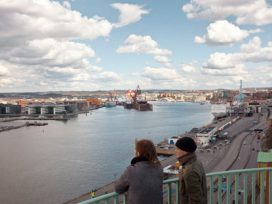We express our understanding in concepts, but each of our concepts is an extreme simplification consisting of unrelated entities. The fact that we include them in one concept does not clarify our view of the world, but rather obscures it. This also applies to the concept of “art”.
Articles
Read more than 6000 articles in 35 languages from over 90 cultural journals and associates.

Structural problems in conventional democracies are alienating citizens worldwide, writes Stephen Holmes. Political marketing, cross-party compromise and elite withdrawal threaten to rob democracy of its original role as instrument of justice.
Roma activist Valeriu Nicolae departs for Euro-Narnia, a parallel world ruled over by the mighty Baroslan whose inhabitants discuss in strange and wonderful terms remedies for the Roma problem. But what is the role of the Queen in all of this?
In conversation with the sociologist Gilles Lipovetsky, novelist and Nobel laureate Mario Vargas Llosa discusses the relative merits of “high” and “mass” culture in the contemporary world and defends the ideas explored in his recent book La civilización del espectáculo.
A more exacting and cosmopolitan public debate has emerged in Norway since the terror attacks of 2011, writes the cultural editor of Aftenposten. Yet the renaissance of critical journalism has not translated into greater political transparency.
On 9 November 1918, the first German Republic was declared; exactly four years later, Hitler staged a putsch. The Reichskristallnacht on 9 November in 1938 was linked to both and on 9 November 1989 the division of Germany came to an end. How, then, should Germany commemorate this fateful and ambiguous day?

Controversy around the film “Innocence of Muslims” has prompted a return to a hard line from the Organisation of Islamic Cooperation on the question of blasphemy legislation. Paul Sims reviews the debate in Britain, arguing for criticism of the motives of offenders and avoidance of the trap of censorship.
Ideology or truth? The uses and abuses of critical thinking
A conversation with Norman Lillegard
In a wide-ranging discussion, Almantas Samalavicius and the philosopher Norman Lillegard consider the dangers of relativism, the crisis of education, pleonexia and the economic crisis, and whether literature should provide moral instruction.
The mythical Mediterranean of the tourist imagination masks a reality of debt, stagnation and social decline. Yet the region colludes in its own downfall, writes Jurica Pavicic, trading in former glories while acquiescing to political and economic exploitation.
Europe’s view of the revolutions in the Arab world is bedevilled by archaic, post-colonial attitudes. If we cannot shed these and continue to think only of material gain, argues Franco Rizzi, we shall remain on the sidelines and watch the Arab awakening turn into a twilight of renewed discontent.
Heroes into victims
The Second World War in post-Soviet memory politics
In post-Soviet societies, narratives of suffering have overtaken heroic triumphalism. Tatiana Zhurzhenko examines reasons for this shift, asking whether new victim narratives reconcile former enemies or provide additional opportunities to articulate hostilities.

What constitutes economic expertise? Looking at how European politics has answered this question over the last four centuries, Werner Plumpe argues that, at any given time, economic expertise is judged according to its coincidence with the conjuncture.
As voters go to the polls in Ukraine, Tatiana Zhurzhenko considers the future prospects of a weak and embattled leadership. Do parliamentary elections still matter? Can the cultural and political divide between western and eastern regions of the country ever be overcome?
The interaction between the legal-rational and neo-patrimonial state provides the key to interpreting developments in post-communist Russia, argues Richard Sakwa. This tension precludes assigning Russia simply to the camp of authoritarian states, but it also means that Russia’s democracy is flawed.

From Ottoman rule through the colonial period, Algiers’ function as military and economic power has been interwoven with processes of migration. Saïb Musette surveys this histoire croisée and asks where Algeria’s international metropolis is heading in the future.

Disconnected port
Recycling Gothenburg's maritime heritage
From the late eighteenth century until the 1960s, Gothenburg’s port served as an industrial centre for the region and point of arrival and departure for migrants of all nationalities. This social-economic history is all but absent in the “harbour identity” promoted today, writes Britta Söderqvist.